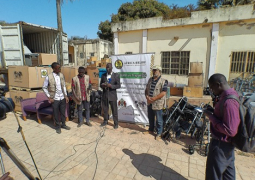The Farafenni Lumo is one of the busiest in the North Bank Region, hence Minister Bubacarr Ousmaila Joof decided to pay a visit to interact with some of the vendors and buyers patronising the market to know their constraints and needs to enable his ministry proffer solutions where necessary.
Minister Joof, accompanied by a large delegation from all institutions under his purview and other relevant stakeholders, took time in the early hours of the day to explore the market to know how it operates, as people come from different communities and across the borders to transact business in the Farafenni weekly market.
Shortly after exploring every nook and cranny of the market, with full interactions with the vendors, the minister spoke to members of the press who accompanied him on the tour, commenting on the unsanitary conditions of all the lumos across the country, saying they are the same in operations and patterns.
“Looking at it all, as these items are lying on the ground, there is some level of unsanitary conditions at these lumos,” the minister said. “These are things that I want us to formalise as a Ministry to work with partners and engage the governors and relevant agencies to make changes to some of these and other constraints in the markets.
“We are not only going to make changes in Farafenni but in all the lumos across the regions in the country to make the people places that are hygienic and conducive to do business.”
Referring to one of the vendors’ comments, he said: “A woman who is a producer as well as a retailer explained that they produce for about three to four months in The Gambia while in the rest of the year, they travel to Senegal to buy vegetables and retail them in The Gambia.”
The minister detested such a situation, saying: “That’s one thing we need to look into as an industry. The ministry would have to see how we can increase their frequency to produce all-year round what they need in the country rather than travelling to Senegal to pick anything and bring to the country.”
Talking about their work with the Ministry of Agriculture and NARI, the minister said: “They should be able to research and find the products and crops they can produce in the country throughout the year. And I think that’s the way to go forward.”
Meanwhile, Minister Joof remarked on the homemade products positively while commenting on the former foundry at the GTTI which was there for years without producing needful things. “Rather we go out to buy something that is a foundry made, which the GTTI can do,” he lamented.
“But now that we have USET (University of Science and Technology) I am seeing the skill development components of the university and this Ministry coming together to work on giving some of these vendors that have skill works necessary for empowerment. And also give them the necessary equipment to produce something that the country needs; not necessarily to avoid importing, but to get what we can produce here in the country.”
The minister advised Gambian women to continue to remain resilient and have the feeling of ownership.
He said: “The women are doing very well in all sectors. We have been to the rice field, and banana fields, you name them, and count the number of stalls in the lumos. The women have demonstrated that they understand trade business, they need to move goods across the border, and they want the movement across the border to be easy to enable them to grow their business transactions.”





